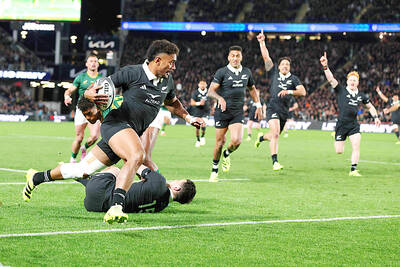The crowd goes wild as the masked wrestlers toss each other around the ring in colorful spandex, but this is no ordinary Mexican lucha libre match: It is the “War of the Sexes,” in which three female wrestlers battle three far bigger men.
Mixed matches like this, which emerged on the wildly popular pro wrestling scene about 20 years ago, could be a metaphor for gender relations in Mexico — a country with a deep tradition of machismo, where women are fighting for equal rights even as thousands of them are raped and murdered each year.
“Get back in the kitchen, you damn hag,” yells a fan in the stands in an expletive-strewn outburst, as a wrestler called Moonbeam, decked out in a sequined leotard and tall boots, throws a left hook at her hulking opponent, Nazi Warrior.

Photo: AFP
Instead of getting upset, Moonbeam says it is “very beautiful” when male fans hurl insults at her.
“It means you’re doing a good job. You’re provoking them and giving them an outlet for their stress,” she said.
“They take out their frustration by yelling at you,” instead of shouting at or hitting their wives when they get home, she said.

Photo: AFP
Moonbeam, a 42-year-old mother of three, says she loves fighting in mixed matches, which she sees as a “power struggle.”
“We want to show the public and our opponents that we can do this too. You don’t have to be a big, strong man. We’re skilled, we know how to fight a match, and we can beat them,” she said.
Her record backs her up: She has beaten nearly 70 men in her 15-year career.
CUTS AND BRUISES
Lucha libre, one of Mexico’s most popular spectator sports, falls somewhere between actual sport and entertainment.
With its outlandish masks, costumes and characters, it packs more than a little spectacle, but the results are not predetermined, insist wrestlers like Moonbeam and her fellow luchadoras Melisa, Princess Legna and Lilly Star.
And the body blows can be all too real. The women all bear battle scars: bruised arms, scraped legs and back injuries.
They also endure sexism and criticism — sometimes from their own families — for pursuing a “masculine” sport.
“Four out of five matches on every fight card are for men,” said Princess Legna, wearing a turquoise mask.
There are rarely separate dressing rooms for women, and “sometimes you can feel [the male wrestlers] sexually harassing you with their eyes,” she said.
Nazi Warrior — who insists he chose his name because it “sounds scary,” not for ideological reasons — said he tries to be “less rough” in the ring when he fights with women.
Violence against women “is OK, but only up to a point,” he said, before climbing into the ring with his own mother, a fellow wrestler who goes by the name Swastika.
Moonbeam’s husband and coach, fellow wrestler Gabriel Martinez, said he gets upset when he sees her getting hurt in the ring.
However, “it’s her job. It’s part of the price she pays for doing what she loves,” he added.
Bathed in sweat, Moonbeam launches herself off the ropes at a towering opponent called Pambacin the Clown and knocks him flat.
She said she always knew she wanted something different than to be a homemaker.
Compared with many Mexican women, she was lucky: Not only is her husband a feminist, her father also supported her unconditionally, she said.
“My dad gave me this career. He paid my gym membership, he bought my sneakers. He was always very proud of me,” she said at the gym where she now trains, in a rough neighborhood in Mexico State, outside the capital.
The state has the worst statistics in the country for violence against women: 301 were murdered there last year.
Moonbeam never finished high school, like many women in her neighborhood.
However, she said being a wrestler “earns you a different kind of recognition than any degree.”
“If you have your picture taken with a luchadora, your family will say, ‘Wow, you know her?’” she said.
“It makes you happy when people applaud and admire you,” said Lilly Star, a slight 28-year-old who divides her time between wrestling and being a mom.
PROMOTING VIOLENCE?
Martinez, Moonbeam’s husband, said wrestling “helps women confront their fears and their own husbands, who often oppress them.”
The luchadoras he coaches often arrive at training sessions with cuts and bruises they got at home, he said.
Wrestling “raises their self-esteem” and teaches them to defend themselves, he added.
“Violence isn’t something we’re proud of, but a woman who knows her place and knows how to put those misogynists in theirs? That’s something to be proud of,” he said.
However, wrestler Tania the Warrior, a white-haired veteran with 41 years in the ring, sees mixed matches as dangerous.
“We’re trying to stop violence against women. What message are we sending to the audience when we put women up against men who are way bigger than them?” she said.
It turns out not to be an issue for Moonbeam and company in this night’s “War of the Sexes.”
After enduring elbows, body slams and pulled hair, they manage to deliver a devastating blow to Nazi Warrior’s stomach, winning them the match — and a hail of boos and cheers from the frenzied crowd.

The Kansas City Chiefs wrapped up a brief visit to Brazil on Friday with a season-opening loss to the Los Angeles Chargers, but despite the defeat, the team outshone their divisional rivals in the fight for the hearts and minds of Brazilian fans. In Sao Paulo for just the second-ever NFL game in the city, Chiefs players — especially quarterback Patrick Mahomes and tight end Travis Kelce — were treated as major celebrities throughout their stay, turning Corinthians Arena into a scene reminiscent of the Chiefs’ Arrowhead Stadium. Before kickoff, crowds of fans gathered around the Chiefs’ tunnel, eager to catch a

New Zealand stayed firm at their Eden Park fortress to claim an attritional 24-17 win over South Africa in a heavyweight clash between the world’s top two rugby sides yesterday. Under pressure after conceding a first-ever defeat on Argentine soil against the Pumas two weeks ago, the All Blacks responded with a performance of grit and discipline to stretch their unbeaten run at their Auckland stronghold to 51 matches. Two well-taken tries by Emoni Narawa and Will Jordan set up a 14-3 lead at halftime before Quinn Tupaea grabbed a third five-pointer for the hosts 13 minutes from time. Well-held for most of

The Wallabies trusted their instincts to keep pushing for a late try instead of a potential equalizing penalty goal late in their Rugby Championship Test match yesterday against Argentina, with prop Angus Bell scoring the clinching try in the sixth minute of added time to give Australia a comeback 28-24 win. The Wallabies were awarded three kickable penalties after the 80th minute, but kept pushing in search of the match-winning try, which was finally delivered by an unlikely hero in reserve prop Bell. “It’s just relieving,” Bell said. “It’s just awesome we could get the win in the end; not go for

Mikel Merino on Sunday scored a hat-trick as a majestic Spain thumped Turkey 6-0 away in World Cup qualifying, while a brilliant Florian Wirtz free-kick helped Germany beat Northern Ireland 3-1 to get their bid up and running. European champions Spain were in unstoppable form in the central Turkish city of Konya, claiming their second biggest-ever away win in World Cup qualifying as Arsenal midfielder Merino scored his first professional hat-trick. Barcelona playmaker Pedri Gonzalez opened the scoring inside six minutes and later completed the scoring, with Ferran Torres netting the visitors’ other goal. The quality of Merino’s strikes was remarkable, with his